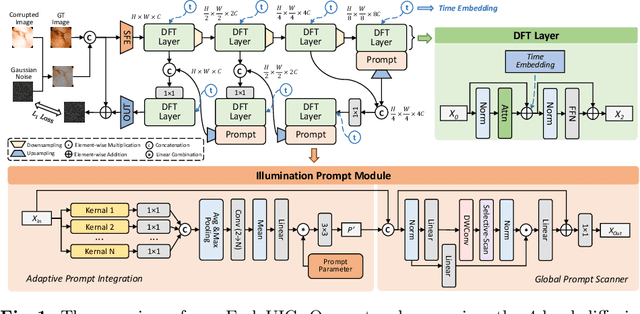Qiaozhi Tan
EndoUIC: Promptable Diffusion Transformer for Unified Illumination Correction in Capsule Endoscopy
Jun 19, 2024



Abstract:Wireless Capsule Endoscopy (WCE) is highly valued for its non-invasive and painless approach, though its effectiveness is compromised by uneven illumination from hardware constraints and complex internal dynamics, leading to overexposed or underexposed images. While researchers have discussed the challenges of low-light enhancement in WCE, the issue of correcting for different exposure levels remains underexplored. To tackle this, we introduce EndoUIC, a WCE unified illumination correction solution using an end-to-end promptable diffusion transformer (DFT) model. In our work, the illumination prompt module shall navigate the model to adapt to different exposure levels and perform targeted image enhancement, in which the Adaptive Prompt Integration (API) and Global Prompt Scanner (GPS) modules shall further boost the concurrent representation learning between the prompt parameters and features. Besides, the U-shaped restoration DFT model shall capture the long-range dependencies and contextual information for unified illumination restoration. Moreover, we present a novel Capsule-endoscopy Exposure Correction (CEC) dataset, including ground-truth and corrupted image pairs annotated by expert photographers. Extensive experiments against a variety of state-of-the-art (SOTA) methods on four datasets showcase the effectiveness of our proposed method and components in WCE illumination restoration, and the additional downstream experiments further demonstrate its utility for clinical diagnosis and surgical assistance.
EndoOOD: Uncertainty-aware Out-of-distribution Detection in Capsule Endoscopy Diagnosis
Feb 18, 2024


Abstract:Wireless capsule endoscopy (WCE) is a non-invasive diagnostic procedure that enables visualization of the gastrointestinal (GI) tract. Deep learning-based methods have shown effectiveness in disease screening using WCE data, alleviating the burden on healthcare professionals. However, existing capsule endoscopy classification methods mostly rely on pre-defined categories, making it challenging to identify and classify out-of-distribution (OOD) data, such as undefined categories or anatomical landmarks. To address this issue, we propose the Endoscopy Out-of-Distribution (EndoOOD) framework, which aims to effectively handle the OOD detection challenge in WCE diagnosis. The proposed framework focuses on improving the robustness and reliability of WCE diagnostic capabilities by incorporating uncertainty-aware mixup training and long-tailed in-distribution (ID) data calibration techniques. Additionally, virtual-logit matching is employed to accurately distinguish between OOD and ID data while minimizing information loss. To assess the performance of our proposed solution, we conduct evaluations and comparisons with 12 state-of-the-art (SOTA) methods using two publicly available datasets. The results demonstrate the effectiveness of the proposed framework in enhancing diagnostic accuracy and supporting clinical decision-making.
 Add to Chrome
Add to Chrome Add to Firefox
Add to Firefox Add to Edge
Add to Edge